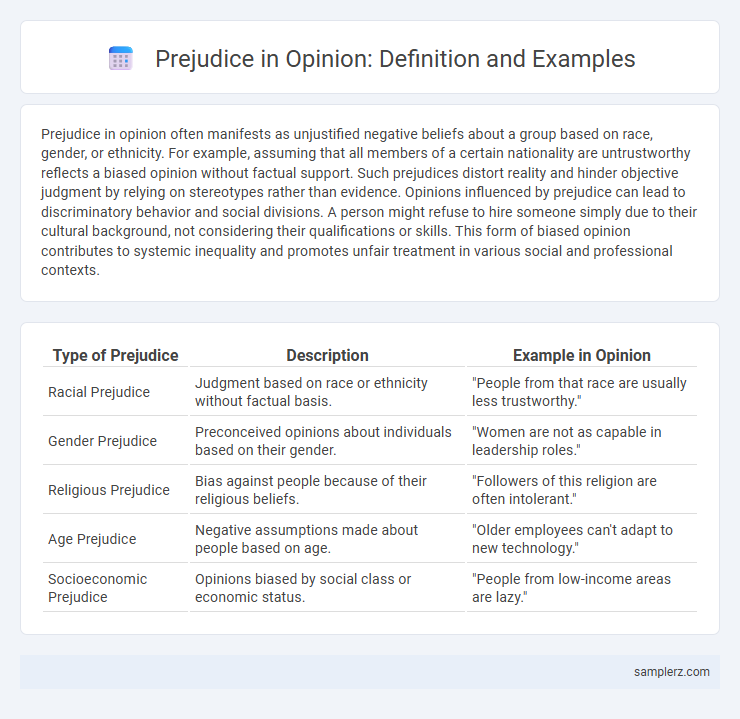Prejudice in opinion often manifests as unjustified negative beliefs about a group based on race, gender, or ethnicity. For example, assuming that all members of a certain nationality are untrustworthy reflects a biased opinion without factual support. Such prejudices distort reality and hinder objective judgment by relying on stereotypes rather than evidence. Opinions influenced by prejudice can lead to discriminatory behavior and social divisions. A person might refuse to hire someone simply due to their cultural background, not considering their qualifications or skills. This form of biased opinion contributes to systemic inequality and promotes unfair treatment in various social and professional contexts.
Table of Comparison
| Type of Prejudice | Description | Example in Opinion |
|---|---|---|
| Racial Prejudice | Judgment based on race or ethnicity without factual basis. | "People from that race are usually less trustworthy." |
| Gender Prejudice | Preconceived opinions about individuals based on their gender. | "Women are not as capable in leadership roles." |
| Religious Prejudice | Bias against people because of their religious beliefs. | "Followers of this religion are often intolerant." |
| Age Prejudice | Negative assumptions made about people based on age. | "Older employees can't adapt to new technology." |
| Socioeconomic Prejudice | Opinions biased by social class or economic status. | "People from low-income areas are lazy." |
Common Examples of Prejudice in Everyday Opinions
Common examples of prejudice in everyday opinions include stereotyping based on race, gender, or age, such as assuming someone's abilities or behavior due to their ethnicity or gender. Another frequent instance is confirmation bias, where individuals selectively interpret information to reinforce existing beliefs about social groups. These prejudices often manifest in workplace settings, social interactions, and media consumption, influencing decisions and attitudes unconsciously.
How Prejudice Shapes Public Opinion
Prejudice distorts public opinion by reinforcing stereotypes that limit understanding of diverse groups, often leading to biased attitudes and discriminatory policies. Media representation and social narratives frequently amplify these preconceived notions, shaping societal beliefs and influencing political decision-making. This biased framework undermines social cohesion and hinders efforts toward equality and inclusion.
Recognizing Implicit Bias in Personal Opinions
Implicit bias often manifests in personal opinions through unconscious associations that influence judgments about others based on race, gender, or social background. Recognizing these biases requires critical self-reflection and acknowledgment that opinions may be shaped by societal stereotypes rather than objective evidence. Tools such as implicit association tests and diversity training can help individuals become aware of and mitigate their own prejudiced viewpoints.
Social Media and the Spread of Prejudiced Opinions
Social media platforms often amplify prejudiced opinions by enabling rapid dissemination and creating echo chambers where biased views are rarely challenged. Algorithms prioritize content that garners strong emotional reactions, frequently promoting divisive or hateful messages. This digital environment fosters confirmation bias, reinforcing stereotypes and deepening societal divisions.
Case Studies: Prejudice in Political Opinions
Case studies reveal that prejudice in political opinions often stems from cognitive biases and entrenched group identities, leading to polarized perspectives on policies and candidates. Research highlights how media consumption patterns reinforce confirmation bias, intensifying partisan divides and fostering stereotypes about opposing groups. These dynamics illustrate the challenge of overcoming prejudice to achieve more balanced and informed political discourse.
Prejudice in Workplace Opinions: Real-Life Examples
Prejudice in workplace opinions often manifests through biased assumptions about colleagues based on race, gender, or age, leading to unfair treatment or obstructed career growth. Studies reveal that women and minorities frequently face unjust evaluations despite equivalent performance, reflecting systemic bias in promotion decisions. These prejudiced opinions not only damage individual morale but also hinder organizational diversity and innovation.
The Role of Stereotypes in Opinion Formation
Stereotypes significantly influence opinion formation by simplifying complex social realities into generalized beliefs about groups, which often lead to biased judgments and restricted perspectives. These mental shortcuts reinforce existing prejudices by promoting assumptions not based on individual experiences but rather on societal narratives. The resulting opinions are frequently resistant to change because stereotypes provide a seemingly consistent framework that confirms preconceived notions.
Prejudice vs. Personal Beliefs: Understanding the Difference
Prejudice involves forming unjustified judgments based on stereotypes or insufficient information, whereas personal beliefs stem from individual experiences and values shaped through reflection. Recognizing this distinction is crucial to avoid bias that can cloud objective evaluation and hinder open-minded dialogue. Misconstruing personal beliefs as prejudice may lead to unfair labeling and social division.
Cultural Influences on Prejudiced Opinions
Cultural influences shape prejudiced opinions through ingrained stereotypes and social norms that perpetuate biases against certain groups. These cultural narratives often lead individuals to form judgments based on collective beliefs rather than personal experience or factual evidence. Consequently, such deeply rooted cultural conditioning reinforces discrimination and social division.
Combating Prejudice in Our Opinions: Steps Toward Change
Prejudice in opinions often manifests through stereotypes that distort individual judgment and fuel discrimination. Recognizing implicit biases and engaging actively with diverse perspectives fosters empathy and challenges preconceived notions. Implementing educational programs and encouraging open dialogue are crucial steps toward dismantling prejudice and cultivating more inclusive attitudes.

example of prejudice in opinion Infographic
 samplerz.com
samplerz.com